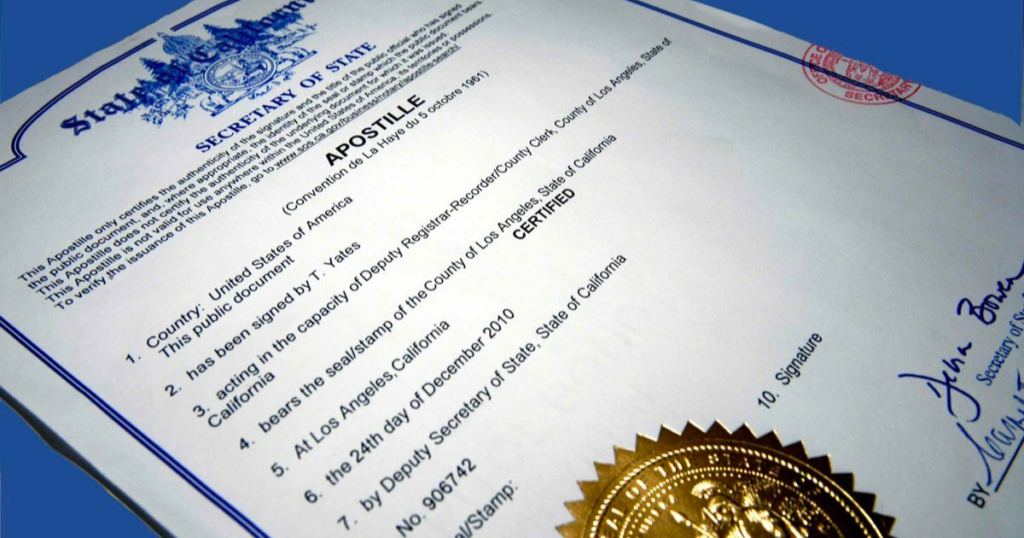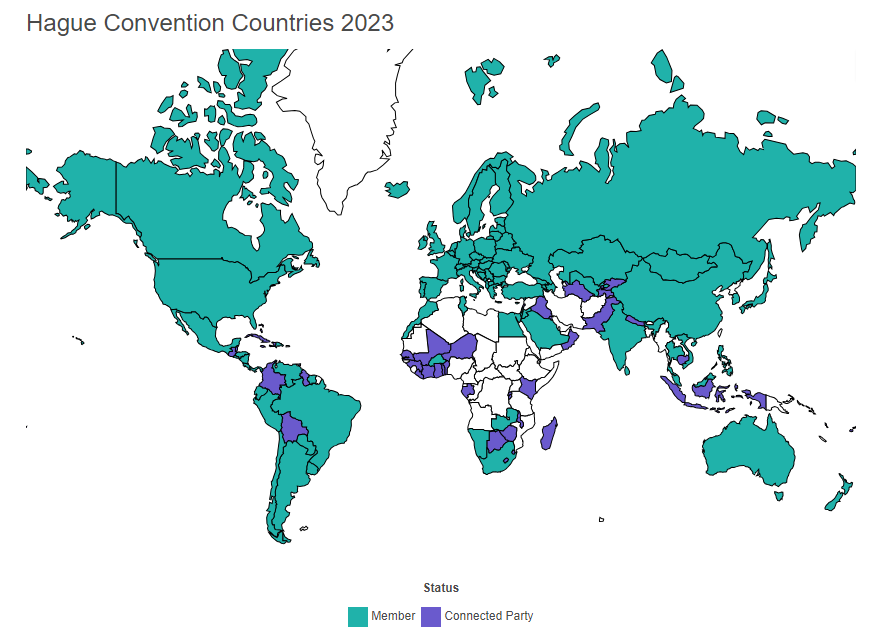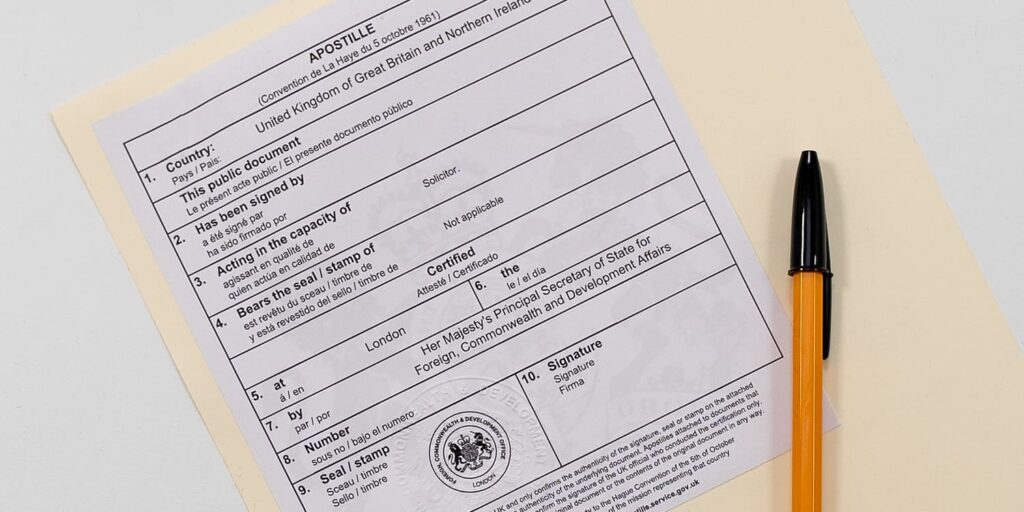Do you know what countries that require an apostille? In today’s globalized world, where the movement of people, businesses, and legal matters across borders is commonplace, this is a piece of valuable knowledge. After all, the increasing international interaction often necessitates the recognition of official documents beyond the borders of their country of origin.
That’s why, to facilitate this recognition, the Apostille Convention – or the Hague Convention of 5 October 1961 – was established. This convention streamlines the process of document authentication for use in foreign countries. An Apostille Certificate or Stamp is the key to this process, providing official validation that a document is legitimate and can be recognized in another country.
Read now: Who offers notary services?
Countries that require an apostille

The Apostille Convention has a wide-reaching impact, with many countries recognizing and issuing Apostilles to facilitate the international legalization of documents. These countries are collectively known as the “member countries of the Hague Apostille Convention“. That means that if a document is intended for use in any of these countries, an Apostille will be required to ensure its acceptance.
As of 2024, those 88 nations include:
Albania, Andorra, Antigua and Barbuda, Argentina, Armenia, Australia, Austria, Azerbaijan, Bahamas, Barbados, Belarus, Belgium, Belize, Bosnia and Herzegovina, Botswana, Brazil, Brunei Darussalam, Bulgaria, Chile, China (Macau & Hong Kong), Colombia, Cook Islands, Croatia, Cyprus, Czech Republic, Denmark, Dominica, Ecuador, El Salvador, Estonia, Fiji, Finland, France, Georgia, Germany, Greece, Grenada, Honduras, Hungary, Iceland, India, Ireland, Israel, Italy, Japan, Kazakhstan, Korea, Republic of, Latvia, Lesotho, Liberia, Liechtenstein, Lithuania, Luxembourg, Malawi, Malta, Marshall Islands, Mauritius, Mexico, Moldova, Republic of, Monaco, Namibia, Netherlands, New Zealand, Niue, Norway, Panama, Poland, Portugal, Romania, Russia, Saint Kitts and Nevis, Saint Lucia, Saint Vincent and the Grenadines, Samoa, San Marino, Serbia and Montenegro, Seychelles, Slovakia, Slovenia, South Africa, Spain, Suriname, Swaziland, Sweden, Switzerland, FYR of Macedonia, Tonga, Trinidad and Tobago, Turkey, Ukraine, United Kingdom, United States of America and Venezuela.
What is an apostille certificate, exactly?
An Apostille Certificate is a form of authentication issued to documents for international use under the terms of the Hague Apostille Convention. The certificate is attached to the original document to verify its authenticity. Once a document has been apostilled, it can be recognized as valid in any other country that is a member of the Hague Apostille Convention. This eliminates the need for a lengthy and costly authentication process in each country where the document needs to be used.

An Apostille contains information such as:
- The country of origin of the document.
- The name of the person who signed the document.
- The capacity in which the person signed.
- Details of any seal or stamp appearing on the document.
- The place, date, and authority by which the Apostille is issued.
- The Apostille’s serial number.
When is an apostille needed?
The requirement for an Apostille arises in various situations, particularly when a document from one country needs to be used in another country that is a member of the Hague Apostille Convention. Typically, the need for an Apostille is specified by legal professionals in the foreign jurisdiction where the document will be used.
However, there are instances where an Apostille might be assumed to be necessary even if not explicitly mentioned.
Documents that commonly require an apostille
- Commercial Documents: Contracts, agreements, and other business-related documents that need to be recognized across borders.
- Powers of Attorney: Legal documents that grant someone the authority to act on another person’s behalf in legal or business matters in a foreign country.
- Birth, Marriage, and Death Certificates: These documents may need to be apostilled for use in immigration processes, marriage in a foreign country, or inheritance matters.
- Academic Credentials: Diplomas, transcripts, and other educational documents that need to be validated for further studies or employment abroad.
- Adoption Papers: Documents related to international adoption processes often require an Apostille to be recognized in the adopting country.
- Affidavits: Sworn statements that need to be used in a legal context in a foreign country.
What is the apostille convention?
The Apostille Convention, officially known as the Hague Convention of 5 October 1961 Abolishing the Requirement of Legalisation for Foreign Public Documents, is an international treaty that simplifies the process of certifying the authenticity of public documents to be used in foreign countries.
Before the Convention, a lengthy process of legalization was required, involving multiple steps of certification by different authorities in both the country of origin and the destination country.
Key aspects of the apostille convention

Purpose
The primary aim of the Apostille Convention is to facilitate the international use of public documents by eliminating the need for diplomatic or consular legalization. Instead, a single Apostille certificate issued by a designated authority in the document’s country of origin is sufficient.
Apostille certificate
The Apostille is a standardized certificate issued by a competent authority in the country where the document originates. It certifies the authenticity of the document’s origin, signature, and seal. Once a document has an Apostille, it is recognized as valid in all other member countries of the Convention without further authentication.
Scope
The Apostille Convention applies to public documents, which include:
- Administrative documents (e.g., birth certificates, marriage certificates).
- Court documents (e.g., judgments, orders).
- Notarial acts.
- Official certificates placed on documents signed by individuals in their private capacity (e.g., certificates of registration, diplomas).
Member countries
The Convention has a wide range of member countries across different continents. These countries agree to mutually recognize Apostille certificates issued by each other, simplifying the cross-border use of public documents.
Exclusions
The Convention does not apply to documents executed by diplomatic or consular agents, or to administrative documents dealing directly with commercial or customs operations.
Implementation
Each member country designates one or more competent authorities to issue Apostilles. These authorities are often government ministries, courts, or other official bodies. The process of obtaining an Apostille varies by country but generally involves submitting the original document to the designated authority, which then attaches the Apostille certificates.

Why understanding apostille requirements is crucial
In today’s interconnected world, understanding which countries that require an Apostille and the process involved is essential for anyone engaged in international legal, business, or personal matters. The Apostille Convention provides a streamlined, efficient way to ensure that your documents are recognized and accepted across borders, saving time, reducing costs, and eliminating the need for complex and redundant authentication processes.
Whether you’re an individual looking to study, work, or get married abroad, or a business expanding its operations into new international markets, understanding this process is key to ensuring smooth and successful interactions with foreign authorities.
At Mobile Notary Orlando, we specialize in providing professional notary services that include helping our clients navigate the Apostille process. Whether you need an Apostille for personal documents, business contracts, or legal papers, our experienced team is here to guide you every step of the way, ensuring that your documents are properly authenticated and ready for international use. Contact us right now!






